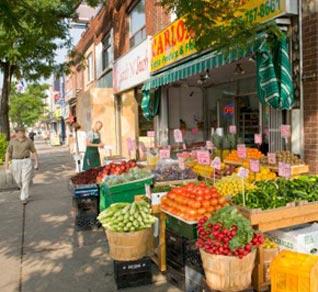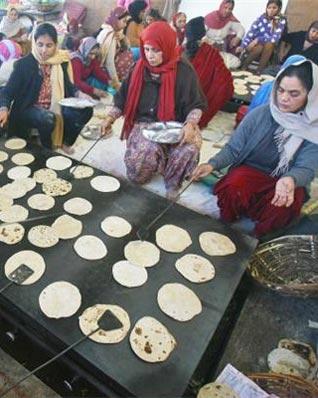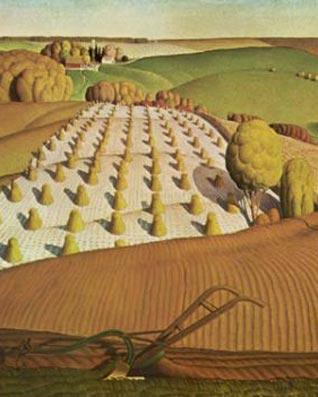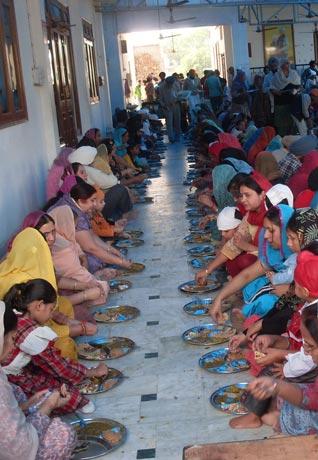Cuisine
Langar Justice: Where Does Our Food Come From?
by SONNY SINGH
Because food is our most primal need and our common bond to the earth and one another, it can ground us as we stretch ourselves to draw in all the interlaced threads - so we can weave a whole, meaningful picture for ourselves. I still believe food has this unique power. With food as our starting point, we can choose to meet people and to encounter events so powerful that they jar us out of our ordinary way of seeing the world, and open us to new, uplifting, and empowering possibilities. - Frances Moore Lappe and Anna Lappe, from Hopes Edge: The Next Diet for a Small Planet
I love food. I love to cook. I love to gather with friends, community, and sangat and share a meal together.
The Sikh institution of langar has always been something near and dear to me, partially because of my borderline obsession with food, but also because it really gets to the heart of Sikhi.
The practice of langar, our free community kitchen, was started some 500 years ago by Guru Nanak to meet a basic human need and to create a space for community-building that reflected the Guru's radical vision of equality. Rules about food preparation and eating were (and still are) one of the central ways that caste oppression was enforced.
Langar turned this all on its head. With everyone sitting together on the same level (on the floor) and eating the same simple food, which was prepared by people from all caste backgrounds, langar was nothing short of a revolutionary accomplishment.
It is with this lens that I want to discuss the food of langar itself.
When I sit down in the langar hall to eat in that very sacred space, I rarely consider where the food is actually coming from. Yes, we very well know the labor of the sevadaars who prepare and distribute the food with love and with the spirit of the Guru.
But what about the ingredients? What do we know about the farmers who grew and harvested the aaloo, gob, and muttar, and if they were being paid a decent wage and treated with respect? What do we know about the living conditions of the cows from whom the milk and butter originated? And what about the handful of multinational corporations that control the majority of the world's food supply and bring home billions in profits?
There is nothing sacred nor revolutionary about harmful pesticides (that affect farm workers, the earth, and those of us who ingest them), the exploitation of migrant farm workers, the horrendous and unnatural confinement of animals on factory farms, and the carbon footprint of having our vegetables shipped from thousands of miles away.
I am well aware of the barriers to accessible, affordable organic, locally-sourced food in many of our communities, especially working class communities. But creative solutions do exist, from CSAs (community supported agriculture) to community gardens (imagine if large Sikh neighborhoods had their own community-run gardens!), farmers markets to food co-ops.
Isn't it time we ask ourselves, as Sikhs who are so proud of our institution of langar and who love our Punjabi food: What are we doing to promote food justice, or more specifically, langar justice?
If langar is an institution that is, at its core, about equality and justice, is it unreasonable to expect ethical and just food sources for this sacred meal we share together as a sangat?
Has anyone ever come across a gurdwara that makes conscious choices about where its food comes from? Any organic langar halls out there? Locavore langars?
I know we're a long way away from this in most of our gurdwaras and communities (where styrofoam use is the unquestioned status quo!). But if Guru Nanak and his followers succeeded in creating the institution of langar in the face of one of the most ancient forms of oppression (caste) hundreds of years ago, it must be possible for us to transform the way we do langar in gurdwaras today to better reflect the values of Sikhi.
[Locavore: Someone who exclusively (or at least primarily) eats foods from their local or regional foodshed or a determined radius from their home (commonly either 100 or 250 miles, depending on location). By eating locally, most locavores hope to create a greater connection between themselves and their food sources, resist industrialized and processed foods, and support their local economy. The majority of locavores do not give themselves a strcit radius from which to eat, but instead buy as much of their food as they can from farmers, growers, and sellers with whom they have a relationship or whose growing or producing practices appeal they want to support.
Many locavores give themselves several exceptions to their local diet. Commonly excluded items include coffee, chocolate, salt, and/or spices - although locavores tend to try and find local coffee roasters, chocolate producers, and spice importers when they can.] ... Definition, courtesy: About.com
January 15, 2011
Conversation about this article
1: Satwinder Singh (Dublin, Ireland), January 15, 2011, 12:49 PM.
Many thanks for such a thought-provoking article which encourages us all to think and go eco-friendly.
2: Sangat Singh (Kuala Lumpur, Malaysia), January 15, 2011, 8:02 PM.
"Ann paani Guru kia ehl sewa sikhaan di" - 'Bread and water belongs to the Guru, and pleasure to serve and share is that of Sikhs!' Prof. Puran Singh went a little further when he declared: "No Sikh with a grain of faith in him could possibly think that he owned the bread." Guru Nanak was a revolutionary and gave us the institution of Guru ka Langar. For the first time he made all downtrodden, destitute and needy sit together in one place with the rest, regardless of caste, creed, colour or religion. There was no question of economic apartheid. They all became equal and shared food at the community kitchen. Today a Sikh gurdwara without a free kitchen is inconceivable. A gurdwara was not just a place of worship but also a training centre to learn - "Vich dunee-aa sayv kamaa-ee taa dargeh baisan paa-ee-ai" [GGS:26.1] - 'In the midst of this world, do seva and you shall be given a place of honour in the Court of the Lord.' At any time of day or night you could see the voluntary service of sweeping, serving water to the thirsty, and serving langar. "Ayk pitaa aykas kay ham baarik too mayraa gur haa-ee" [GGS:611.19] - 'The One God is our father, we are the children of the One God. You are our Guru.' This actual business was started by Guru Nanak. This was the temple of bread that need not worry from where the provisions came.






